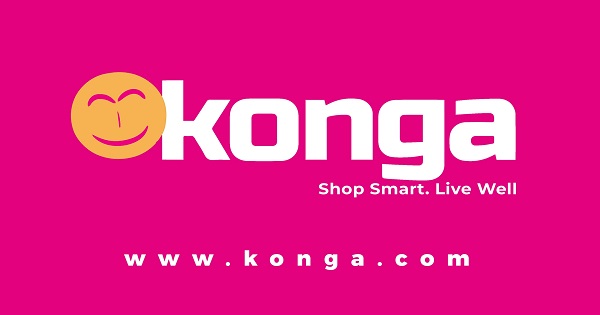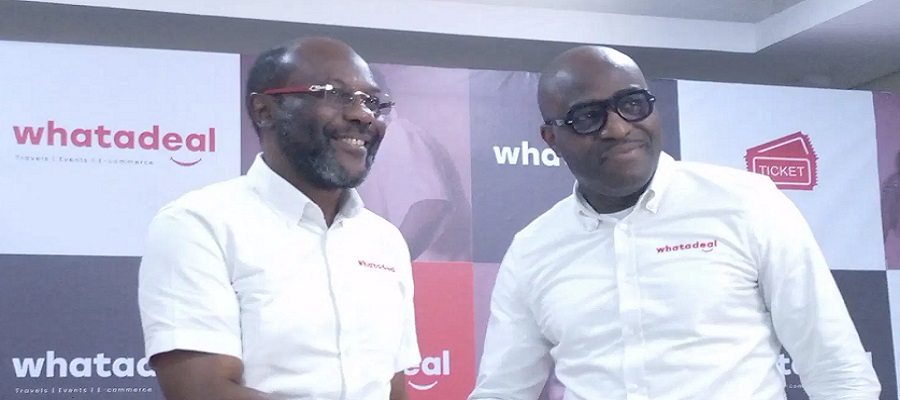E-Business
Konga, Yudala: Partnership to Unlock eCommerce in Africa

E-commerce in Africa has remained a tough nut to crack.
Despite significant optimism of an unprecedented upsurge in global e-commerce spend which is widely expected to gross $4.058 trillion or 14.6% of total retail spending by 2020, e-commerce in Nigeria and on the African continent is still largely untapped.
Till date, majority of players in the sector are locked in a battle of attrition in their bid to turn profitable. Many others have lost the battle and quietly exited the scene. The list of such failed ventures is seemingly endless.
Recently, an operational merger between two e-commerce giants, Konga and Yudala was announced – a piece of news that has dominated headlines for the past one week.
According to the official announcement released by the management of both companies, the business merger, which takes effect from Tuesday May 1st 2018, will see both companies operate under the Konga brand name and with dual CEOs in the persons of Nick Imudia who will be in charge of online among others and Prince Nnamdi Ekeh who will be responsible for the offline arm of the business.
Founded in 2012, Konga has featured prominently in the news in the past couple of months following its acquisition by Nigerian tech giants, Zinox Group, after months of intense negotiation with the company’s erstwhile majority investors, Naspers and AB Kinnevik.
A merger between Konga and Yudala is a master strategy that undoubtedly has the potential of finally cracking the e-commerce bug in Nigeria and beyond.
Here are five reasons why:
Strongest e-commerce force in Africa
The merger between Konga and Yudala has ultimately transformed the new Konga brand into a strong e-commerce group, arguably the biggest on the African continent.
By virtue of the shared resources that will naturally benefit the brand from the merger including sheer size, human resources capacity, massive warehousing capabilities, increased reach and wider array of products, services and offerings at its disposal, industry watchers and other experts are unanimous in their position that Konga can finally rise as an e-commerce force that can rival some of the world’s biggest such as Amazon and Alibaba.
Improved customer experience
One of the major obstacles that has prevented e-commerce from taking off in Nigeria is shoddy customer experience.
With Konga and Yudala merging operations, there is renewed hope for the average customer, especially when one considers a fusion of Konga’s world-class online platform and Yudala’s ubiquitous network of physical stores.
Both platforms are efficient, highly responsive and respectively best in class in the industry. With this merger, perhaps, the time has come to look forward to a highly improved shopping experience, one that has largely eluded many in the industry.
Cutting-edge Technology
Konga is primarily a technology company, one that has invested heavily in technology and crucially reliant on cutting-edge tech to drive its operations.
By merging forces with Yudala, another technology-driven business and leveraging on the huge access to technology at the disposal of its parent company, the Zinox Group, there is a golden opportunity to improve the ease and convenience of the shopping experience, a factor that has recurrently featured as one of the pain-points of e-commerce.
Through the deployment of technology in automating most of the processes that have previously encumbered shoppers, including products classification, stocking, check-outs, logistics and delivery, among others, a fresh dawn seems imminent for e-commerce in Nigeria.
Should the new brand live up to expectations by deploying a predominantly automated, user-friendly range of cutting-edge tech solutions, it will succeed in creating a frictionless e-commerce experience that will set a standard for the continent.
Better logistics/delivery
Many e-commerce companies across Africa leave a lot to be desired when it comes to service level expectations in logistics/delivery.
Items take days or even weeks to get to the final user, even in urban city centres, leading to a situation in which many potential shoppers would rather prefer to visit a physical/brick-and-mortar store to purchase or personally pick-up their items.
In Konga Express, Konga boasts an excellent logistics company with advanced delivery capabilities for internal and external customers.
Through the expected new investment that will come in through the Yudala merger, shoppers can finally look forward to a more reliable delivery option. Further lending a sense of excitement is the multiple pick-up locations which Yudala’s nationwide network of store locations offers.
Overcoming distrust by cracking mobile payments
Trust remains a major issue that has kept e-commerce in Africa from reaching its much-vaunted potential.
A number of potential shoppers are wary of scams, a legitimate concern which prevents many from disclosing their credit/debit card/financial information and buying online.
Although Konga announced a ban on payment on delivery (POD) before its acquisition by the Zinox Group, there are possibilities that this policy could be rescinded in the light of the merger with Yudala.
Furthermore, through Konga Pay, a CBN-licensed mobile money platform, Konga has a fitting tool with which to crack the mobile payment bug.
By positioning Konga Pay prominently as a secure platform and doing the hard work at the back-end to assure online transactions are effortlessly and safely carried out, e-commerce may just be on the verge of exploding in Nigeria and beyond.
E-Business
SystemSpecs’s Subsidiary Deelaa Becomes Whatadeal

SystemSpecs Holdings Ltd unveiled at the weekend the rebranding of its subsidiary Deelaa to Whatadeal, launching an ambitious digital commerce platform poised to transform travel, events, and e-commerce across Africa.

John Obaro, group managing director, SystemSpecs, and Fela Bank-Olemoh, managing director of Whatadeal
The announcement comes amid a surging demand for integrated digital services in Nigeria and beyond, as the continent’s e-commerce and travel sector stand on the cusp of exponential growth.
The launch event, held in Lagos, demonstrated SystemSpecs’ vision for a seamless, value-centric consumer experience.
This strategic rebrand follows the company’s acquisition of Knit Technologies, amalgamating cutting-edge innovation and industry expertise into Whatadeal—one of four subsidiaries under the SystemSpecs umbrella.
John Obaro, group managing director, SystemSpecs, emphasized that the transformation reflects an unwavering commitment to technological advancement and customer empowerment.
“Whatadeal transcends a mere rebranding—it embodies a dynamic ecosystem designed to deliver unparalleled value and memorable experiences,” Obaro told reporters.
He elaborated, “Our ambition is to ensure that whether you’re organizing an event, procuring tickets, or seeking the finest deals, Whatadeal is your definitive destination. We are also in advanced discussions with leading travel industry players to curate exceptional travel experiences across Nigeria.”
Originally introduced in 2022 as an e-ticketing and marketplace platform, Deelaa catered to both businesses and consumers.
Its evolution into Whatadeal responds to shifting market dynamics, offering an integrated solution for booking flights, securing event tickets, and shopping online.
The platform will be powered by Remita, SystemSpecs’ acclaimed electronic payment and collection system, which underpinned Nigeria’s Treasury Single Account initiative—one of the most extensive implementations of its kind in Africa.
Steering this venture is Fela Bank-Olemoh, managing director of Whatadeal and a SystemSpecs stalwart since 1998.
With over two decades of expertise spanning technology, marketing, and public service, Bank-Olemoh brings a formidable pedigree to the role.
He founded MediaVision Limited, a preeminent sports marketing firm in Nigeria, before serving as Special Adviser on Education to the Lagos State Governor from 2015 to 2019 and later as Senior Special Assistant on Education Interventions to Nigeria’s President from 2019 to 2023.
Bank-Olemoh articulated the platform’s ethos: “At Whatadeal, we hold that exceptional experiences and valuable offers should be effortless, not convoluted. Our mission extends beyond merely facilitating deals—we are cultivating an ecosystem that nurtures engagement, trust, and enduring value for our customers.”
He added, “Whether you’re arranging travel, acquiring event tickets, or purchasing essentials, you deserve an intuitive, rewarding experience that consistently delivers excellence. Whatadeal is dedicated to realizing that vision.”
SystemSpecs aims to establish Whatadeal as the preeminent one-stop platform for African consumers, blending convenience with competitive offerings.
With its fusion of Knit Technologies’ innovations and Remita’s robust infrastructure, Whatadeal is poised to redefine digital commerce on the continent.
E-Business
Cybersecurity Firm Says It’s Time to Back it Up, As the World Marks World Backup Day

How much do you trust your device memory? Definitely more than you should. According to the statistics only 33% of users back up their data regularly, and more than 77% of people have already experienced data loss.

An annual tradition which started as a simple reddit post back in 2011, World Backup Day is celebrated on 31st March 2025 to provide a reminder of the importance of backing up data. To mark the occasion, Kaspersky shares practical advice on how to create new beneficial digital habits to ensure your backups are safe.
The first question that should be taken into consideration is: what exactly needs to be backed up? The answer seems to be lying on the surface.
The more you back up – the better. Work-related documents, family photos, financial info, health records, logins and passwords, and even content shared within messengers. In fact, all of this needs to be backed up using reliable storage methods.
There are several reasons why it is recommended to copy as much data as you can.
First of all, the device on which the information is stored may simply be lost, stolen or damaged. For example, UK’s South Western Railway reports that at least 5 smartphones are lost per day on its network, which is almost 1800 devices per year.
Among other potential threats to data safety are ransomware attacks. This is a type of malware that blocks a computer and then demand a ransom for its release. In some cases, even paying the ransom does not help to restore data on an infected device.
Despite these substantial risks, in everyday life it’s almost impossible (and to some extent pointless) to back up everything. Our devices contain gigabytes of information, most of which has no value. Creating backup storages of such a scale is time-consuming and expensive.
The main advice is to rank data correctly. Try to assort the items needing to be backed up by evaluating their relevance, recency and recovery options.
If a file, record or password is outdated or may be replaced by a newer version, backup may be safely ignored. If it is a new or highly valuable piece of information, backing up is necessary and preferably there should be more than one copy.
The art of backup
The next step towards data loss prevention is finding the suitable backup method to select. Obviously, it depends on multiple factors: type of data, type of device, pricing, user’s personal preferences and habits.
The most popular backup options are generally cloud or external storage services. Both of these methods have their pros and cons. For example, cloud services give you instant access to information wherever you are, but they require regular subscription payments.
At the same time, external hard drives are reliable storages which only require one payment, but access to information on these devices is only possible when they are at hand.
Therefore, cloud storage is regarded as the perfect option for storing files and photos which should always be available in a few clicks, while external storage services are suitable for data archives and huge files, such as movies or videos which you rarely use. Overall statistics show that nowadays most people choose cloud technology as their main storage option.
Specific data such as passwords, ID or financial details require even more secure storage methods.
Among the potential solutions password manager is an option that protects sensitive personal information, prevents its loss and provides immediate access to it at any time. Automatic filling of authentication and banking data means users do not have to memorise important information and reliably protects data from being compromised.
While choosing backup and storage options it’s highly recommended to consider all the aspects. To get backing up into a real habit, the method should not only be reliable and effective, but also suitable and convenient for you personally.
Enhanced protection
As it has been already mentioned, single manual backup might not be enough to protect data from being lost. World Backup Day is the right time to remember that data might be vulnerable and take some proactive steps to secure it. Kaspersky has created some tips on how to do it effectively:
- Follow the rule 3-2-1. One of the most popular backup strategies is to have at least 3 copies of important data, store it on 2 different storage types, and make at least 1 copy off-side (cloud or external physical location).
- Set up automatic backups. Most devices and services have a preinstalled backup function, which automatically creates a backup if you forget to make a copy in time.
- Use a reliable security solution. Comprehensive digital protection with a specific anti-ransomware protection mechanism, such as in Kaspersky Premium, prevents device infection and protects your data from both local and remote-access ransomware attacks.
- Make regular checks. It’s necessary to test your backups workability on a regular basis to notice the malfunction in time and fix it.
E-Business
FG Launches Online Visa Approval Centre

Dr. Olubunmi Tunji-Ojo, minister of Interior, has announced the launch of an Online Visa Approval Center to eliminate bureaucratic bottlenecks and reduce corruption in the visa application process.

Commissioned by the President in December, the new system ensures that applicants no longer need to visit a visa office, know anyone in the system, or lobby for approvals.
At a stakeholders’ sensitisation workshop on the implementation of the Nigeria Visa Policy (NVP) 2025, yesterday in Abuja, Dr. Tunji-Ojo said the visa is considered a very important document by the government because it is an instrument of migration management and an instrument of economic development.
The minister explained that Nigeria has to strike a delicate balance between national security and, of course, the ease of migration.
“And we think that it’s something that we can do and something we will do.
“We don’t have a physical Visa Approval Center. If you apply for a Nigerian visa anywhere in the world, you do so online. We process it here in Nigeria, and if approved, you receive your e-visa in your email,” he explained.
To enhance efficiency, the government has set a 48-hour deadline for processing e-visas.
“It is unprofessional and unacceptable for the Nigeria Immigration Service not to approve or provide feedback within 48 hours,” the minister stated.
“It breaks my heart that people need to lobby to even get visas to Nigeria. It shouldn’t be so. It shouldn’t be.
“For anybody that is qualified, for anybody that wants to do legitimate activities in Nigeria, such people should be able to come to Nigeria easily. And this is why we are opening our space. Mr. President is interested in foreign direct investments.”
Further, he said Nigeria is interested in partnering with the rest of the world to develop its economy but, “We can’t do that when we allow bottlenecks to hold us down. So these reforms, basically, are aimed at opening our space, enhancing national security, and we hope that the primary responsibilities of the visa scheme will be achieved.”
Kemi Nandap, controller general, Nigeria Immigration Service (NIS), said the NIS would fully digitize its e-visa platform and reduce visa classifications from 79 to 44 to enhance accessibility, transparency, and efficiency in the new visa policy.
She said, “At the core of this policy is the new e-visa platform—a fully digitized, centralized system that revolutionizes how foreign nationals interact with our country’s entry procedures. As part of this transformation, the Nigerian Visa Policy 2024 underwent a comprehensive review, resulting in a significant reduction in visa classifications from 79 to 44.
“These categories have been logically grouped to simplify procedures, reduce complexities, and greatly improve the user experience. Importantly, we have maintained the original purpose and intent of each visa class throughout this reform.”

 Telecom2 days ago
Telecom2 days agoMTN, Lynk Global Make Africa’s First Satellite-to-Mobile Call

 General News2 days ago
General News2 days agoSERAP Asks National Assembly to Drop Bill to Jail Nigerians who Fail to Vote

 E-Business2 days ago
E-Business2 days agoSystemSpecs’s Subsidiary Deelaa Becomes Whatadeal

 E-Financial2 days ago
E-Financial2 days agoNigeria Gets Fresh $500m World Bank Loan for Economic Stimulus Programme

 E-Financial2 days ago
E-Financial2 days agoUninsured Depositors of Heritage Bank to Receive Liquidation Dividends In April – NDIC

 Telecom2 days ago
Telecom2 days agoSmart Treasure Investment Team’s Initiatives Eradicate Poverty, Says Aminu

 E-Business2 days ago
E-Business2 days agoCybersecurity Firm Says It’s Time to Back it Up, As the World Marks World Backup Day

 General News2 days ago
General News2 days agoFG to Elevate Enugu Tech Festival to National Event – Minister















